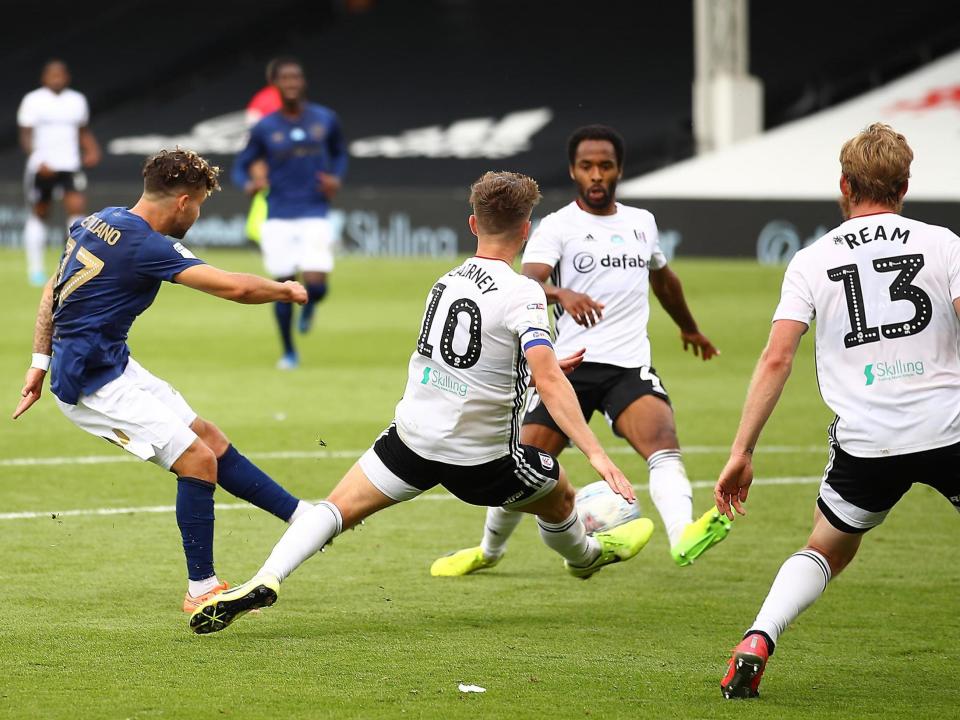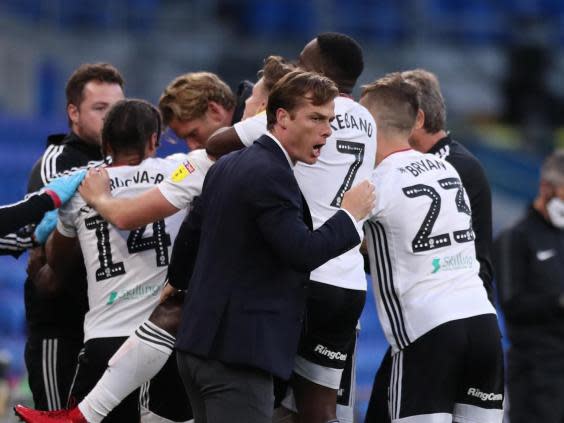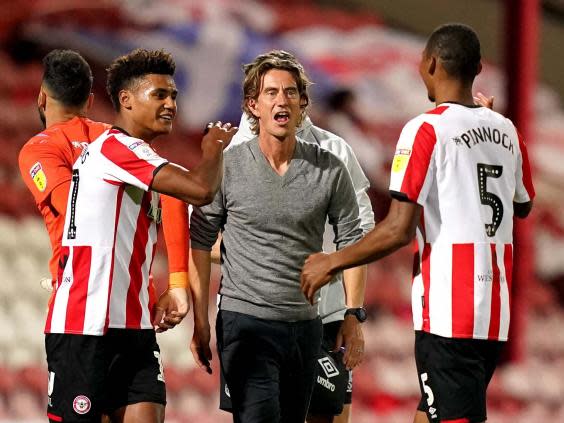Brentford vs Fulham: Expect the unexpected in the Championship play-off final, a match where the maths rarely adds up

If the feeling around Fulham is that they may be going back to where they belong, Brentford are talking about the greatest story in their history, and a new era. “The dream”, as manager Thomas Frank said.
Being a Danish manager, he naturally faced mentions of Euro 92 and the anniversary of Hans Christian Andersen’s death in his pre-match press conference. The latter actually falls on the date of Tuesday’s Championship play-off final, but you don’t have to go back so far to appreciate the scale and context of this match – and not just as regards the financial value that is so often referenced.
The two clubs are only separated by a few miles in London, and goal difference in the table, but there is a lot more between them in terms of outlook and approach.
Fulham have been a fixture of the Premier League over the last two decades and currently possess one of the most expensive squads in the Championship, having only gone down last season. Brentford haven’t been in England’s top division since 1947, and still have one of the lowest budgets in the second tier.
They simply don’t have the dimensions of a Premier League club. They would be the smallest to ever reach the level.
That is one reason why their story seems so much more engaging, and why there is so much more narrative momentum behind it. It is as if there is this will for “little Brentford” to come up and add to the resolve of the playing squad, with elements like their last game at Griffin Park and an emotional tribute to late director Robert Rowan only intensifying this notion.
The infamous issue with the play-offs, however, is that they have a habit of overturning narrative momentum and a whole lot else. They don’t always make sense, or seem all that fair.
The “hidden gem” of Brentford’s rise – as Frank put it – has of course been incorporating this reality, and working around it.
“Football is such an overheated and irrational industry,” co-director of football Rasmus Ankersen said earlier this year. The club will hope that for once doesn’t apply to the play-off final, since the feeling remains they are the better team – if only just.
How they got there on such a budget is a story now well told. It involves the most intuitive and insightful use of analytics, the smartest approach to the market, and finding value that others have overlooked. These are statements that have been made about many other clubs, but owner Matthew Benham’s regime has ensured they have been taken to the most logical degree possible – with emphasis on the word “logical”. They look at discarded players or dismissed leagues, assess what could be improved – which is where, importantly, Frank’s “human touch” comes in – and go from there.
This is what happens when mathematical rationality is a principle of a club, and why they are now on the brink of a feat many for a long time felt impossible to imagine. One reason this bears repeating is because it’s still so effective, as so much of football is still so “irrational”, and so many clubs don’t follow anything close to this model.
You could argue one of them is Fulham.

While Scott Parker deserves credit for their late-season rally, it still feels as though they’ve underperformed with this squad. One argument is that their position is just the consequence of spending more money than your rivals, and ensuring a critical threshold of quality, rather than any kind of calculation. It is certainly difficult to see some of the logic in paying close to £30millioj on Bobby Reid, Ivan Cavaleiro and Anthony Knockaert.
At the same time, they have been adapting to the Championship and the pressure to get rid of the big earners that got them relegated, while keeping some of the more reliable players. It’s just that one source described it as a more chaotic Wolves, in that it’s taking a punt on potential promotion, rather than the kind of sophisticated model that is now characterising the Championship and clubs like Brentford.
This contrast is also reflected in the football.
Brentford are currently one of the most exciting teams in the game. They typify the Germanic pressing dominating the game right now, with that stemming from a side in which every player has an exact role, so – as with everything else – the club is extracting the maximum possible. They can be exhilarating when they’re in full flow, Mathias Jensen playing raking passes for one of that front three – Ollie Watkins, Said Benrahma, Bryan Mbeumo – to produce something magical. It is, like so much with Brentford, cold mathematics in flowing emotional symphony.
The problem with football is the mathematics don’t always add up. One missed chance or one mishap in one game can make a huge difference.
Fulham know this too well. Against Brentford’s rousing approach, they play a more rudimentary game. Some liken it to Jose Mourinho’s when he was at his peak – which is also over a decade ago. Perhaps that’s no surprise since Parker played under the Portuguese and that era was when he was at his peak as a player, but it is essentially well-organised backlines and relatively free-form attack. A more critical view might be that their attacking plan amounts to little more than getting it up there and letting Aleksandar Mitrovic take care of the rest. If that falls down, rely on a dribble or long-range effort.
That is where their greater quality, relative to the Championship, is so relevant. It will often make the difference. It’s just that it’s so much more reliant on individual inspiration than Brentford. Hence the huge contrast in budgets, but similarity in league position.
As regards the difference in the play-offs, another factor from that individual quality is that Fulham also have much greater individual experience of such games. This has been another big part of the journey for Brentford, a step into the unknown.
There is the slight concern that, having gone into their semi-final second leg on the back of three deflating defeats, Brentford mustered their last big push for that last big night at Griffin Park. The question is whether they’re spent. It happened to Derby County last season.

Henrik Daalsberg was immediately dismissive of such a notion. “Nope!” he simply declared. Frank has been working to make sure the mentality is right – and that involves not seeing themselves as a small club on the pitch.
“The fact is we are still a small club,” Frank says. “We are. We have a minor budget, a minor stadium. We don’t have the same experience. History speaks for itself – we have not been in the top tier for 70 years. So definitely. But the mindset in terms of how we can perform against bigger teams and bigger clubs – that has changed.
“I did not know we were the bigger story. I understand it, the way things have progressed. I don’t think Fulham care. Everything will be decided on the pitch.”
They’re both so close to the top – but both now just have to get past an opponent so close to them in London.
“It is amazing to think it comes to the 49th game of season, and it’s a west London derby,” Parker says. “So little to separate them.” Now, just one game. “One of us will be the winner and be happy with that and you will write one story,” Frank added. “The other team will lose, be sad, and you will write another story.”
Fulham hope it’s the same old story for them. Brentford hope it’s one of the greatest the game has seen.
The play-offs, however, don’t always offer the ending you’d expect.
Read more
How much is Championship play-off final really worth?
Mitrovic returns in time for Fulham’s play-off final against Brentford

 Yahoo Sport
Yahoo Sport 





































